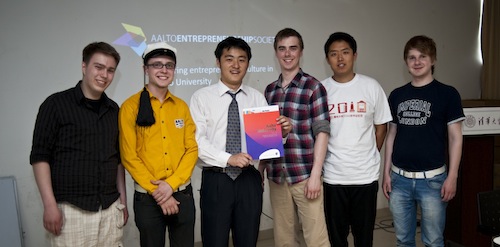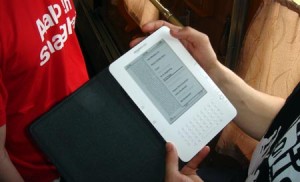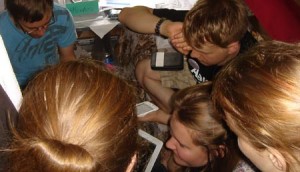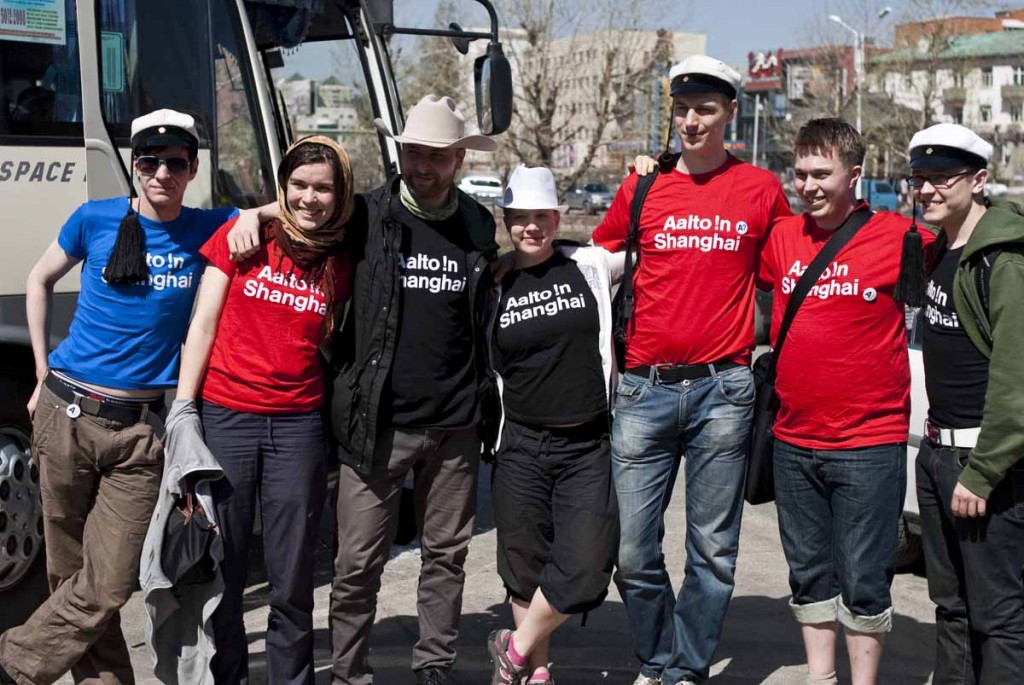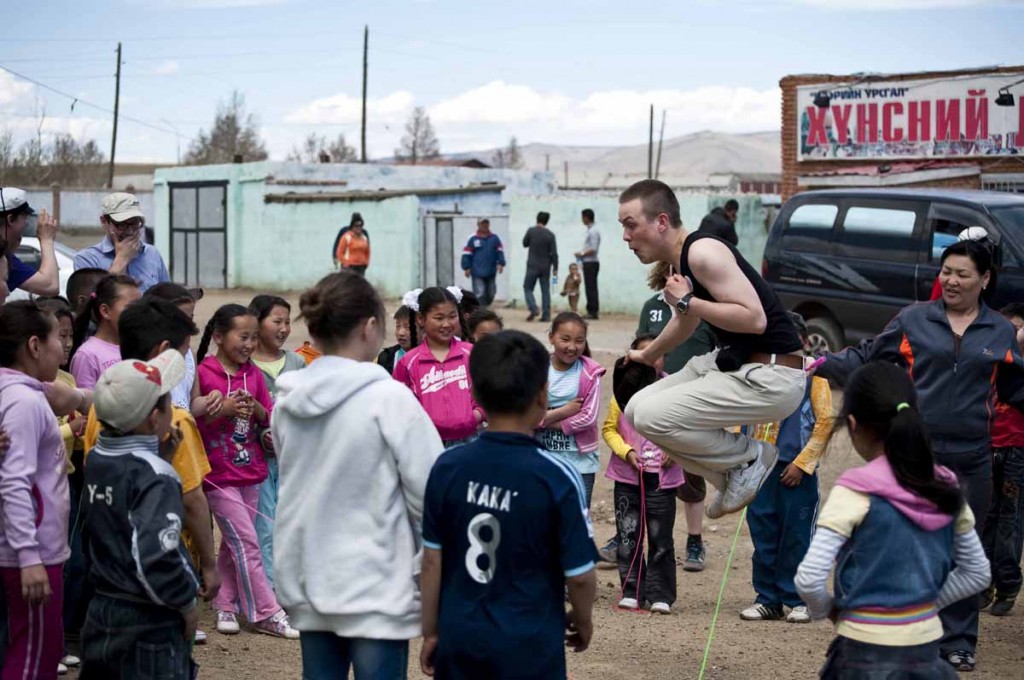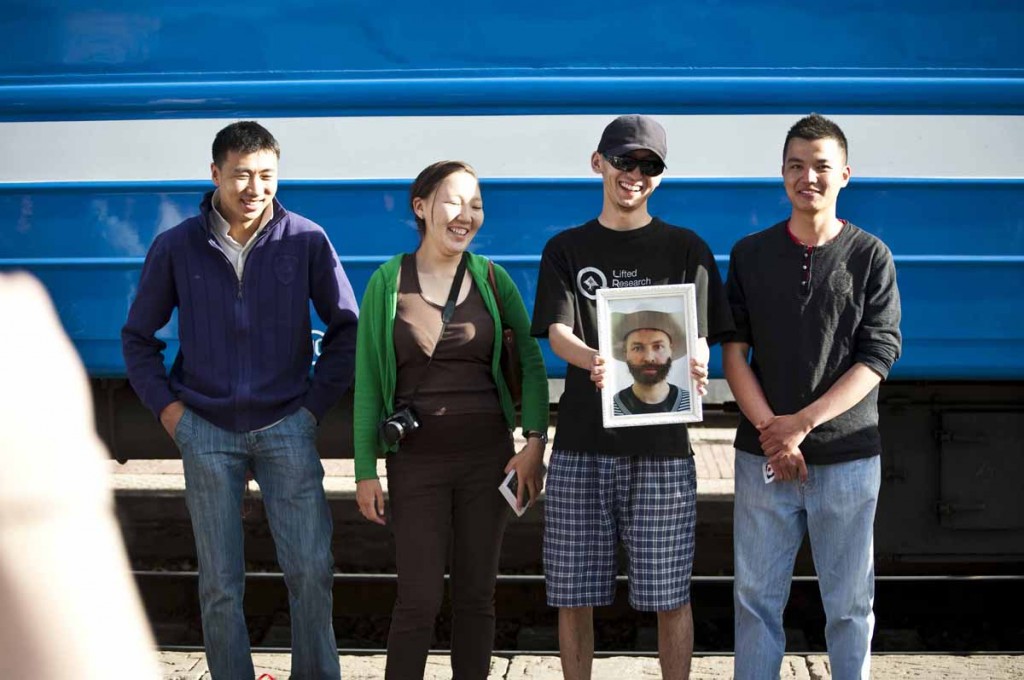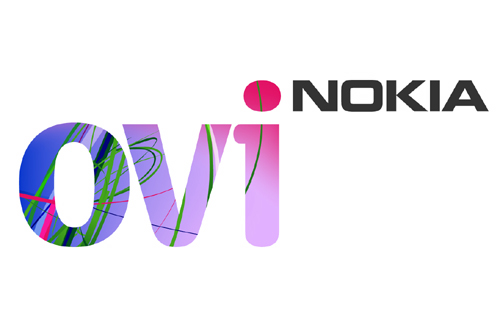Aalto on Tracks is taking around 100 people from the Aalto University community with a private train from Helsinki to Shanghai World Expo, China, on May 2010. That's over 10 000 kilometers and a week on tracks!
Our goals are to take Aalto University, Finland and Finnish education to the world. We want to unite Aalto people and create an unforgettable learning experience for around a hundred Aalto people and guests.
Follow us on the map and via Talky!UPDATE: A new video uploaded. This was shown in Aalto University opening ceremony in autumn 2010.
Have a look at the scenery in Siberia and a brief view in our train!
Big thanks for Anna, Ina and Dimitri (music) and Heikki for putting this video together in two days. Full video about Aalto on Tracks and all the program we had will be released later.
- Mikko
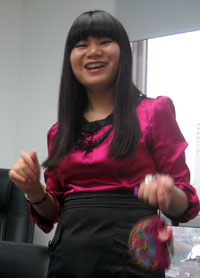 Today we got more insight into Chinese culture. Outotec HR manager HE Ying made us feel warmly welcome right from the beginning.
Today we got more insight into Chinese culture. Outotec HR manager HE Ying made us feel warmly welcome right from the beginning.
We had a deep dive into Chinese culture in topics such as dining, working and one child’s policy. Ying told us about amazing Chinese business culture and the difficulty in seeking for talent in China. There would be about 50-100 applicants per day for an open position in Outotec China.
Moreover division manager Simon Courtenay gave us a comprehensive, yet easily understandable and interesting presentation on the processes mining and in handling metals and other commodities. Outotec has pioneering technologies that help to cut down water, energy and raw material consumption.
- Kirsi
We arrived in Shanghai early Sunday morning – by train, of course. After breakfast and settling into our amazing 30-floor hotel, we had a chance to meet local students of Tongji University.
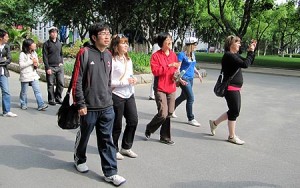 Tongji University is one of Aalto University’s cooperation partners in China. A concrete cooperative project shared by Aalto and the Tongji University as well as the starting point of a shared future is Aalto-Tongji Design Factory (ATDF). On Tuesday, we will attend the Aalto-Tongji Design Factory opening. ATDF is a physical place that brings together people and activities on the Tongji campus. It is a platform where students and researchers encounter enterprises and society. ATDF hosts various multidisciplinary and international courses, happenings, projects and initiatives.
Tongji University is one of Aalto University’s cooperation partners in China. A concrete cooperative project shared by Aalto and the Tongji University as well as the starting point of a shared future is Aalto-Tongji Design Factory (ATDF). On Tuesday, we will attend the Aalto-Tongji Design Factory opening. ATDF is a physical place that brings together people and activities on the Tongji campus. It is a platform where students and researchers encounter enterprises and society. ATDF hosts various multidisciplinary and international courses, happenings, projects and initiatives.
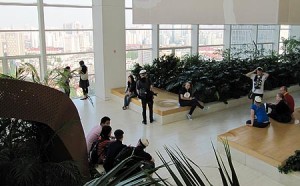 We were glad to meet so many students of different disciplines at the Tongji University on Sunday. Our hosts showed us around the campus, took us to enjoy traditional Chinese lunch, and we had great discussions about student life in Tongji University. We were amazed by the beauty and architecture of the campus area.
We were glad to meet so many students of different disciplines at the Tongji University on Sunday. Our hosts showed us around the campus, took us to enjoy traditional Chinese lunch, and we had great discussions about student life in Tongji University. We were amazed by the beauty and architecture of the campus area.
- Hanna
After the ridiculously long bus ride we finally arrived to Beijing around 6am in the morning. Having spent the last 14 hours in a bus somewhere in China, the hotel felt dreamy: Wide beds and real showers weren’t something we had gotten used to.
Since it was our only day in Beijing many brave ones decided to skip sleeping altogether and make the most of it. Some even tried to reach the Great Wall within the few hours we had (the attempt failed though, but I’m sure they came up with other amazing adventures ![]() ). Our bunch grabbed a taxi and rushed to see how the Forbidden City was doing.
). Our bunch grabbed a taxi and rushed to see how the Forbidden City was doing.
Aaltoes and BATES people
Around 15 entrepreneurially minded Aalto on Tracks participants had a workshop with Tsinghua students from BATES. The topic was social entrepreneurship and sustainable development project in western China.
In the afternoon, the rest of us headed to the Tsinghua University campus where a couple of students took us around the beautiful campus. After having lunch in a local hamburger restaurant (which was, by the way, veeery similar to the one we all know) the guided tour continued. However, me, Atso and Heikki decided to find our own way through the campus and back to the metro station.
Our little adventure was wonderful! Just walking around and watching how local students live, study and enjoy was interesting. Besides seeing football fields, beautiful roses, a wedding couple and an island in the river crossing the campus, we sneaked in to a building to have a look at a lecture which apparently had something to do with communist party politics. At least that’s what we were told, and mind you, that’s what the sickle and hammer style table in the front of the auditorium sort of implied, too.
In the end of the day like this, even though a short one, it’s easy to like Beijing. I’m definitely looking forward to coming back in a week. But now towards Shanghai!
-Saara
On Thursday morning we arrived to the border of Mongolia and China. After living five days in our turned-to-home –train, feelings were of course a bit mixed, but mostly excited, as we didn’t yet know what was going to happen during the day. If we had, the “excited” would have been more like desperate or something.
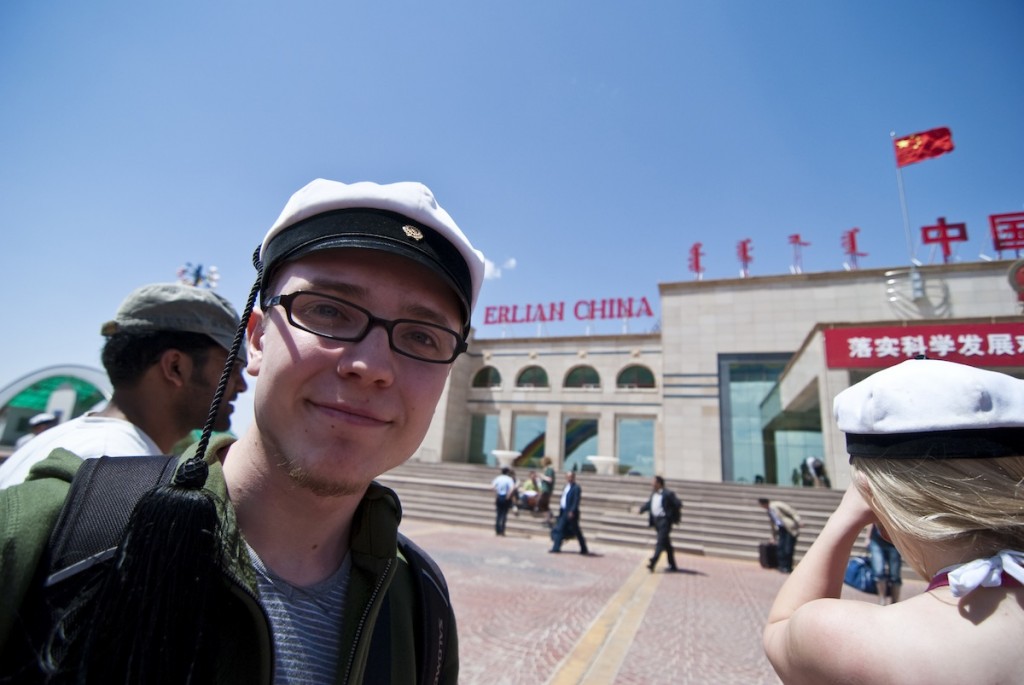 Erlian is a city just behind the Mongolia border. We made it to China!
Erlian is a city just behind the Mongolia border. We made it to China!
Because of the train schedules and width of the tracks, there was two busses from Erlian (the city in the border) to Beijing. It was supposed to be around 8 hours to 12 hours trip, depending on our luck with the border control, traffic and other random factors The strategy for most of us for the previous evening was not to drink to too much and not to sleep too much, so that no one wouldn’t feel ill but would be able to sleep during the supposed-to-be-long –ride.
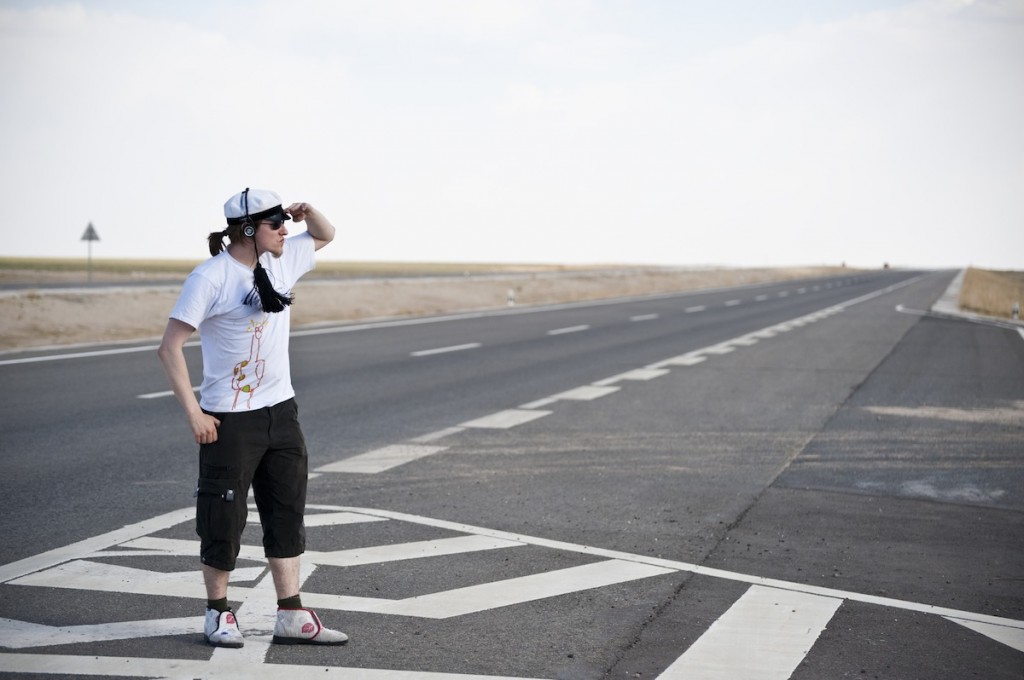 Antti somewhere in Gobi desert in China during our bus trip.
Antti somewhere in Gobi desert in China during our bus trip.
Even though we successfully executed the strategy, it still wasn’t that pleasant trip, but maybe a fun story to tell afterwards ![]()
When we arrived to the border control between Mongolia and China, the first bad news was announced. “There’s surprisingly lot of traffic, so we’ll have to wait here for four hours – and yeah, you can’t go out, since we’re surrounded by scorpions.” Needles to say, that there wasn’t any air conditioning and that the air outside was pretty hot. It was really chaotic, we we’re unpacking and packing the buses as we got through different steps, but finally we made it in about 3 hours.
After the border, we drove to the bus station nearby to change our buses and again move the luggage from one place to another. While we were missing our drivers, we went to a small restaurant to enjoy our first Chinese meal, which was delicious and surprisingly affordable. The cook and other waiters in restaurant was in a bit hurry when 80 people suddenly appeared to empty restaurant ![]()
When I first woke up after a few hours and looked outside of the window, I was shocked, because we were sideways in the middle of the (empty) highway. Apparently the bus drivers had navigated badly and now we had to turn back, so they had just decided to turn right there. Luckily the road was empty but still, +3 hours to the ride!
Pretty soon the same happened again, but this time we were reversing 10 kilometers on the highway, as there wasn’t enough space to turn! The road was closed because of some sort of accident and there actually were at the previous crossroad policemen trying to inform the bus drivers, but they didn’t notice (or care about) it. The reversing took quite a long time and the length of our trip just got increased by 2 hours.
While travelling and waiting, we figured out that there’s no point in just waiting, but started to arrange program. For example during the stops the bus guide (who spoke English) was teaching some basic Chinese language to some of us ![]() Also it should be mentioned, that three exams were made during the trip.
Also it should be mentioned, that three exams were made during the trip.
Because of the closed road, the traffic on the other routes was pretty heavy, so we ended up waiting in the lines for a few hours. In the end, the trip took about 20 hours from the border to Beijing. There we took freshening showers and ate a nice breakfast in a hotel, before continuing with the visit to Tshingua University and the final part before Shanghai.
Cheers,
Lauri
 I’m sitting in a train to Shanghai and finalizing a presentation about shoes. During the past few days I’ve been working for Smile & Shine company to develop shoe cleaning.
I’m sitting in a train to Shanghai and finalizing a presentation about shoes. During the past few days I’ve been working for Smile & Shine company to develop shoe cleaning.
Smile & Shine is a company that rent out machines to the office buildings and hotels, where you stick in your shoe, press the button and it comes out nice and shiny. The idea is, that the company also takes care of the maintenance, so that the machines can actually be used without risk of shoes getting damaged.
In the spirit of Aalto, we gathered a multi-disciplinary team, lots of post-it’s to our beloved restaurant car and started to brainstorm new features and potential customer segments. One of the key questions was, what else people could do while spending a minute on polishing their shoes? Maybe a screen in the machine with advertisements?
The workshop was fruitful, as we had interesting discussions and drew some really awesome pictures of the shoe polishing machines from the future. Maybe someday those will turn into reality ?
Cheers,
Lauri
Case eReader started 16.5 with a presentation about the motives of the case. What are we trying to find out and how we are going to utilize user driven open innovation when collecting the experiences and new ideas of the users considering eReaders.
The starting presentation was held in the private train’s conference car by Miikka Tölö and Ville Purontaus.
Real users, their new ideas and interesting environment to develop eReader devices were the most important thing in this case. For example media houses in Finland have interests of the new ideas innovated during the train trip.
The basic idea of the case was to find out new ways to use eReader devices and innovate new content in them. This innovation process is done by the people in the train. The people in the train are from different backgrounds and have different kind of lifestyles and interests. These are reasons why we used Living Lab concept in the train to find out the ideas made by the real life users.
The whole train was a ”Living Lab” where every person in the train was possible innovator for the eReaders. People could lent the eReader devices in the train and use them freely. We had an innovation wall where users could add their ideas with post it-papers fast. This made possible others to see what kind of ideas is there and can these ideas be developed even further or can there be a different kind of approach. We also had a question form and interviews about the user experiences. Free discussions played a major role when innovating in a group.
Doing case eReader while traveling through the Russia and Mongolia in a private train gave unbelievable circumstances to find new ways to develop and innovate.
I actually can’t imagine right now better group of people, circumstances and team spirit what we had there in the private train to develop new possibilities to make eReaders something totally new.
We don’t want to tell the new innovations here yet but we’re sure that they’re going to bring eReaders closer to everyone and making the eReader experience better in the future!
-Ville
We’ve been in the train for almost a week now. Yesterday morning we had a longer stop, in the capital city of Mongolia, Ulaanbaatar. Although we got up early, we woke up to a very beautiful and sunny day.
In the morning, we had great breakfast after which we continued to the Unkknown Russian Soldier monument to discuss more about Mongolian life, history, and culture. Our guides were around the same age as we were and spoke perfect English, were very polite, and incredibly insightful about their own country.
We split up after the waar monumnet as most of the people went straight to the National Park. The rest of us had a visit to the Ulanbataar Public Library. The library IT manager Begzsuren Jamsranjav and others hosted us in the library. They had really prepared the meeting for us by putting some Finnish stuff on the walls and making special presentation for us. You can have a look at the libraries Twitter account.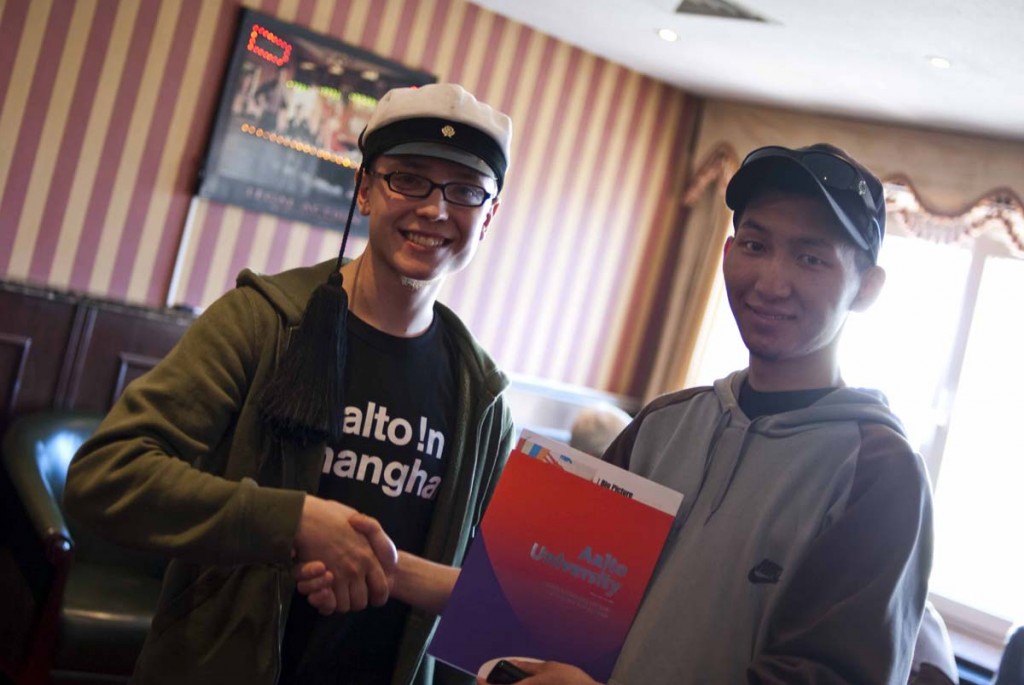
One of our guide was interested in to study at Aalto because of free education.
After the library visit, we continued our journey to reach the other part of the group at the National Park. Due to the Czech Prime Minister’s visit, there was a detour and we had an unexpect, but interesting stop in the country side. There was group of local primary school students playing skip rope and football. We joined them for a while, and it was amazing to experience the joy of the local people
playing and having fun.
Simo playing skip rope!
After the traffic jam, we finally arrived at the National Park, where the rest of our group was. We had a visit in traditionals yurt houses, met the locals, and had a chance to ride camels and horses. They had also prepared an amazing lunch with Mongolian lamb and dumplings set against some amazing scenery.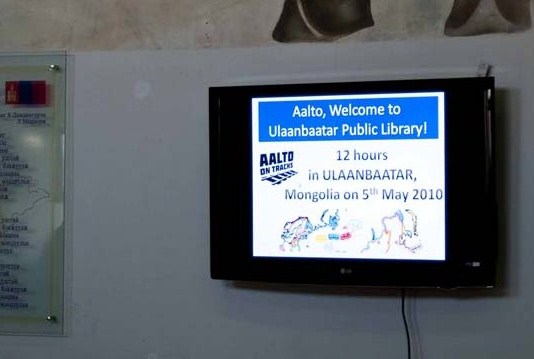
All in all, Mongolia was a fascinating country, albeit a very poor country. The atmosphere in the city was pretty Sestern, although there was a lot of Soviet buildings still around, as it seems the Mongolians are quite proud of their history with the Russians. Traffic was also
a pretty horrific experience.
After lunch, we returned to the station to catch our train. We thanked our guides and gave away some of the spare food we had for some of the charity projects the guides had going on.
Although the participants very much enjoyed our time and experiences in Mongolia, we had to experience the most tragic event that unfortunately does happen on the Trans-Siberian railway. As we left Ulaanbaatar, our train struck a man on the track, killing him on impact. This event sparked a number of reactions and emotions from the participants of Aalto on Tracks. While no one could prevent the accident, we discussed and listened to many different responses and self-reflections we each had regarding the tragic event. Moreover, we ensured participants had the proper support to cope with the situation if needed.
Nonetheless, we’re looking ahead to the journey and we are excited to cross the Chinese border tomorrow. Before arriving, we are having our last culture and language classes on the train to prepare for the new country.
We are very sad that we are leaving the private train that has become a home for all of us. We will miss the staff who have been so great to us. Beijing and Shanghai are now awaiting us!
Greets from the Gobi Desert!
- Mikko
 Early birds had chance to see the frozen Lake Baikal early Wednesday morning. The train followed the shoreline for a couple hours. There was still plenty of ice on the lake and it was surrounded by snow covered mountains. Given any chance some of us would have loved to have a dip in the water, but that was not possible due to the train schedule. Nevertheless, some people think this has been the highlight of the trip so far.
Early birds had chance to see the frozen Lake Baikal early Wednesday morning. The train followed the shoreline for a couple hours. There was still plenty of ice on the lake and it was surrounded by snow covered mountains. Given any chance some of us would have loved to have a dip in the water, but that was not possible due to the train schedule. Nevertheless, some people think this has been the highlight of the trip so far.
Our days on the train are filled with interesting activities. We have gathered to discuss and attended workshops about new product development, recruitment, communications, and internationalization of Aalto University to name just a few. We have also been testing different eReaders along the way and designing new campus solutions for Aalto University.
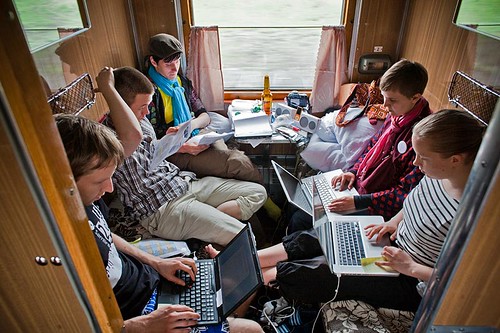
In the case provided by Outotec, recruitment was discussed. “It is important that not only the active ones get a job, but that the right person is hired into right position”, participants argued. New online recruitment service was suggested where students could update their profile and what would include extensive information about e.g. studies and student’s future plans concerning his/hers career. Companies could take part into the development process of the service. “This could be accomplished as an Aalto project sponsored by several companies”, students said.
Students have completed questionnaires about internationalization at Aalto University and are having small group discussions to discuss their experiences and opinions about internationalization. Language used and language competence at Aalto are two big related issues but not the final answer to internationalization. The concept of internationalization can be defined in many ways, and participants on the train too have different understandings of what it is or should be. There is general agreement that Aalto should be more ‘international’ by any definition. And for most people here on the train it means more foreign students and staff on campus, involved in our everyday activities. More study exchange opportunities are desired and some even want a period of study abroad to be an expected part of all degree programs at Aalto. The discussions are continuing.
- Hanna & Anne
